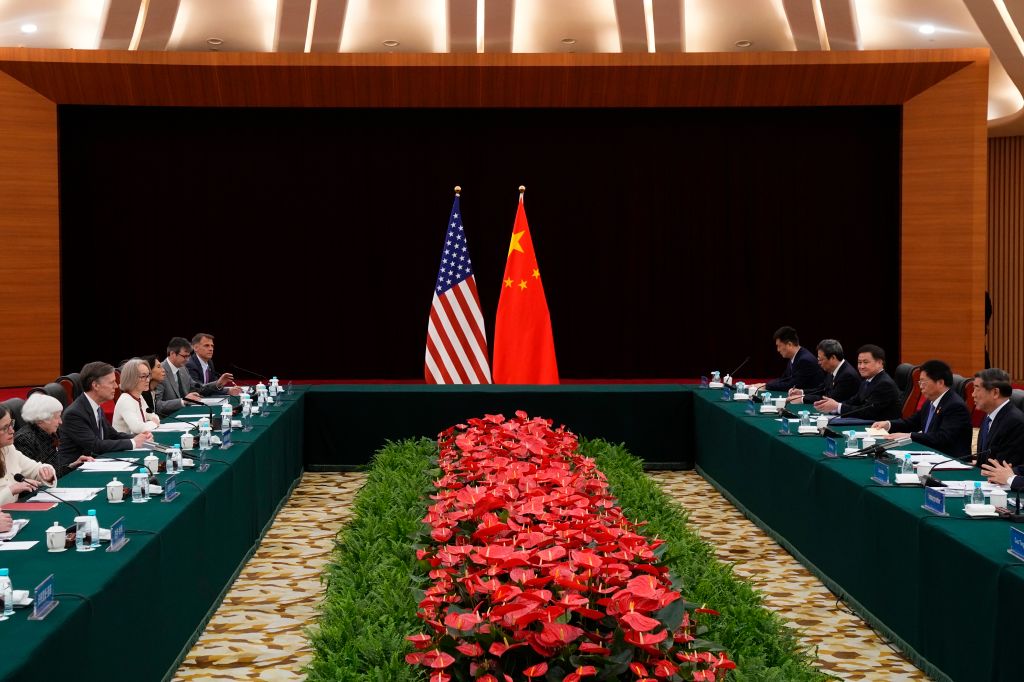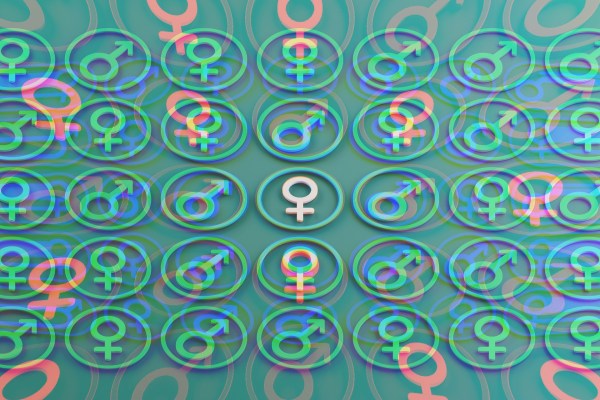Happy Friday! The head of the White House Office of Science and Technology Policy has instructed NASA to create a standard time zone for the moon by the end of 2026. We can’t even imagine how complicated this might be, but if the scientists would permit us to offer a word of advice: Whatever you do, don’t try to save any daylight. Trust us.
Quick Hits: Today’s Top Stories
- National Security Council spokeswoman Adrienne Watson said Thursday—and the Israeli war Cabinet confirmed—that the Israeli government would take “immediate action” to increase the flow of aid into the Gaza Strip by coordinating with Jordan and opening a land crossing at Erez in northern Gaza and a port for the direct delivery of aid. Watson’s statement described the moves as coming “at the President’s request.” President Joe Biden spoke to Israeli Prime Minister Benjamin Netanyahu earlier on Thursday and conditioned U.S. support for Israel’s war on the country’s efforts to mitigate and address civilian harm in Gaza, after seven aid workers were mistakenly killed on Monday by an Israeli airstrike. Biden “underscored that an immediate ceasefire is essential to stabilize and improve the humanitarian situation and protect innocent civilians, and he urged the Prime Minister to empower his negotiators to conclude a deal without delay to bring the hostages home,” the White House summary of the call said. U.S. officials later clarified that a ceasefire should be contingent on the release of Israeli hostages. Axios reported Thursday that CIA Director Bill Burns is expected to travel to Egypt this weekend to meet with the head of Israeli intelligence and Egyptian and Qatari officials to continue efforts to secure the return of the remaining hostages in Hamas captivity.
- A federal judge ruled on Wednesday that migrant children living in makeshift camps at the U.S. southern border awaiting asylum processing are in Customs and Border Protection (CBP) custody and are therefore subject to a 1997 court settlement requiring “safe and sanitary” conditions. The ruling came after a result of a class-action lawsuit on behalf of migrants living in the open-air camps, particularly in two areas along the California-Mexico border, while they wait to be arrested and processed by CBP officers. The judge held that CBP’s control over their ability to leave these camps meant that the children were functionally in their custody.
- Judge Scott McAfee—overseeing Fulton County District Attorney Fani Willis’ racketeering case against former President Donald Trump and more than a dozen co-defendants for efforts to overturn the results of the 2020 election in Georgia—on Thursday rejected Trump’s efforts to have the case thrown out on free speech grounds. “Even core political speech addressing matters of public concern is not impenetrable from prosecution if allegedly used to further criminal activity,” McAfee ruled. However, he left the door open for the defense to bring such a First Amendment challenge during the trial itself. Judge Aileen Cannon, presiding over special counsel Jack Smith’s case regarding Trump’s alleged mishandling of classified documents, ruled against Trump’s efforts to have the bulk of the case dismissed on the basis that the former president had a right to keep the documents based on the Presidential Records Act (PRA). However, Cannon also held that, although an argument about the relevance of the PRA “does not provide a pre-trial basis to dismiss,” neither does it foreclose the possibility of Trump using a PRA defense during the trial.
- The centrist No Labels political organization announced on Thursday it was ending its effort to mount a third-party presidential campaign after failing to find candidates to run. No Labels “would only offer our ballot line to a ticket if we could identify candidates with a credible path to winning the White House,” the group’s CEO, Nancy Jacobson, said in a statement. “No such candidates emerged, so the responsible course of action is for us to stand down.”
- The nonpartisan, unicameral Nebraska Senate on Wednesday overwhelmingly rejected an effort to change the state’s Electoral College vote allocation to a “winner-takes-all-system” favored by former President Donald Trump. The current system, which gives two of the state’s five Electoral College votes to the candidate who wins the state and then a vote for each congressional district a candidate wins, is similar only to Maine and could result in the Democratic candidate picking up an Electoral College vote in deep-red Nebraska by winning the state’s single toss-up congressional district. Another bill to change the allocation is still in committee, with no vote currently scheduled before the end of the legislative session later this month.
More ‘Magic Mushroom’ Diplomacy

As the chief financial officer of the U.S. government, Treasury Secretary Janet Yellen has plenty of weighty decisions on her plate. But the secretary puts no less care into what’s on her dinner plate, making a point to sample the local cuisine during official trips around the country and the world. During her first visit to China as Treasury secretary last summer, Yellen enjoyed a mushroom dish—popular in Yunnan, a southwestern Chinese province—that apparently has “hallucinogenic properties” if not cooked correctly.
But Yellen’s latest trip to East Asia has nothing to do with magic mushrooms. She arrived Thursday in the Chinese export hub of Guangzhou as a representative of the Biden administration, which is concerned that China—facing a grim economic outlook and a cratering real estate sector—will turn to manufacturing as a solution to their woes and dump government-subsidized, cheap goods into the U.S. market. But it remains to be seen what policy tools U.S. officials may deploy to shield domestic industry.
Yellen laid out what she sees as the risks in a speech at a solar cell manufacturer in Georgia last week. “In the past, in industries like steel and aluminum, Chinese government support led to substantial overinvestment and excess capacity that Chinese firms looked to export abroad at depressed prices,” she said.“This maintained production and employment in China but forced industry in the rest of the world to contract. Now, we see excess capacity building in ‘new’ industries like solar, EVs, and lithium-ion batteries.” China’s overproduction, she’s argued, could depress prices and threaten U.S. and global manufacturing, particularly in the nascent green energy sector supported by funds from the 2022 Inflation Reduction Act.
Yellen’s visit comes after a year of slowly improving U.S.-China ties. Relations that were on the rocks for months hit rock bottom in the wake of spy balloon-gate last February: High-level diplomatic contact effectively ceased, months after China had also cut off routine military-to-military communication with the U.S. following then-Speaker Nancy Pelosi’s trip to Taiwan. The Biden administration launched a full-court press to try to thaw relations, dispatching Yellen, Secretary of State Antony Blinken, and Labor Secretary Gina Raimondo, along with other officials, on state visits to China. The outreach culminated in President Joe Biden and Chinese President Xi Jinping meeting in person on the sidelines of the Asia-Pacific Economic Cooperation (APEC) summit in San Francisco last November. In another sign of potentially warming relations, the pandas are coming back.
Yellen’s previous visit to China last July—a tête-à-tête in search of economic detente—reflected the U.S. desire to separate the U.S.-China economic relationship from broader geopolitical disagreements. “The United States will, in certain circumstances, need to pursue targeted actions to protect its national security, and we may disagree in these instances,” Yellen told Li Qiang, China’s premier. “However, we should not allow any disagreement to lead to misunderstandings that needlessly worsen our bilateral economic and financial relationship.”
“We believe that the world is big enough for both of our countries to thrive,” she added.
Easier said than done. In advance of this trip, Yellen has taken a harsher tone. “We don’t want to be overly dependent and they want to dominate the market,” she said this week. “We’re not going to let that happen.” Although the Treasury secretary has emphasized that she doesn’t want to spark a trade war, the Chinese government has threatened to respond in kind to additional trade restrictions. Xi and Biden had a lengthy phone call on Tuesday where the U.S. president “raised continued concerns” about Beijing’s “unfair trade policies,” according to a readout from the White House. Based on the Chinese Foreign Ministry’s account of the call, Xi countered by saying, “China is not going to sit back and watch” if the U.S. tries to contain his country’s green development.
The Chinese Communist Party (CCP) has long prioritized government investments in sectors it deems strategic, often leading to production in excess of domestic demand. “They always overproduce in these areas all the time, no matter what,” said Derek Scissors, a senior fellow at the American Enterprise Institute and chief economist at the China Beige Book, a data-collection firm tracking the Chinese economy. “They have had excess capacity in solar for a decade, steel, shipbuilding, you name it.” China accounted for nearly a third of global manufacturing output in 2022, and its 2023 manufacturing surplus was 1.7 percent of global GDP. What’s more, China dominates green tech manufacturing in areas—China controlled 80 percent of global production capacity for solar panels and more than half of the electric vehicle (EV) battery market in 2023. The European Union has launched probes into the imports of Chinese electric vehicles and solar panels over suspicions of unfair competition.
The specter of another China shock looms large in the minds of American and European lawmakers. The first such shock followed the U.S. granting China Permanent Normal Trade Relations in 2000 and the Asian giant joining the World Trade Organization (WTO) in 2001. Suddenly, American and European markets had effectively unfettered access to cheap Chinese manufactured goods, and domestic manufacturing never fully recovered. Fast forward two decades and both the U.S. and Europe are investing significantly in reshoring—boosting manufacturing capacity at home—with an eye toward climate goals, green infrastructure, and “de-risking” critical industries, like semiconductors and chips, from China.
“The first China shock in manufacturing employment and manufacturing capacity is much bigger than anything that can happen now because it already happened,” Scissors told TMD. “This is nothing like that kind of scope.”
“[But] just because it’s not as big,” he added, “a ‘second China shock’ doesn’t mean we shouldn’t get ready—we should.”
Some economic observers argue that, outside of EV batteries and solar panels, the threat of Chinese overcapacity concerns lower-tech manufacturing that Western nations don’t try—or need—to compete in. Others concerned about Chinese export dumping are debating how the U.S. should respond. Biden has largely maintained the Trump administration’s tariff regime, including a 25 percent tariff on Chinese auto imports, and the White House has been considering increasing tariffs on EVs and sensitive goods like critical minerals. Yellen, who had previously signaled support for rolling back some tariffs, didn’t rule them out when asked about potential new trade restrictions on Wednesday.
But tariffs aren’t the only potential solution, if indeed there is a problem. The Dispatch’s own Scott Lincicome recently argued that the WTO’s system for challenging and remedying unfair subsidization is a more effective means of resolving anti-competitive dumping than national retaliatory tariffs. Noah Smith, an economic commentator, believes unilateral protectionist policies are an insufficient solution. “The U.S. will not be able to stand against that juggernaut by retreating behind a fortress of tariffs and trying to become an expensive, smaller mini-China,” he wrote for his Substack on Thursday. “The only way the U.S. will be able to stand against that juggernaut is to get a big gang together. We have to weld the economies of the democratic nations into a single whole, sharing supply chains and markets and technology.” Less reshoring, then, and more ally-shoring, as it were.
Regardless of which tools the U.S. pursues, policymakers will need to decide which sectors are most vulnerable. “The first step on the U.S. side is to say, ‘Well, where do we not want cheap Chinese goods?’” Scissors told TMD. “‘Some people might say, ‘I don’t want money going into the auto industry because I want it to go into critical minerals which have broader applications than just autos.’ It’s worth having the policy discussion now.”
Worth Your Time
- For his Substack Very Serious, Josh Barro wondered what happened to deficit politics. “Now the economic conditions of the early 1990s have reasserted themselves,” he argued. “Since late 2021, crowd-out has roared back: money is tight, and when the government competes with private borrowers, the result is the elevated interest rates and inflation we’re experiencing right now. But not only have the deficit politics of the early 1990s not reasserted themselves, politicians and voters haven’t even regained the vocabulary they had 30 years ago about why the deficit mattered. … I’m not suggesting that ordinary voters 30 years ago had a granular understanding of the interaction between monetary and fiscal policy. But I do think a lot of voters shared the intuition that, when the government borrows a lot of money, that makes it more expensive for anyone else to buy things, especially if they need to borrow money to do it. … The key question I have is: now that this intuition is correct again, how can we make it widely shared again?”
- Why did Threads—the X alternative that has had only modest success in the U.S.—take off in Taiwan? “While most users left Threads soon after its launch and meteoric rise in July 2023, in Taiwan people have recently started to come back to the platform,” Zeyi Yang reported for MIT Technology Review. “There, Threads has dominated app-store download charts for months. Prominent officials have set up accounts, and it’s become the most popular platform among young people. … What defines the content on Threads is a mix of political and lifestyle posts. On the one hand, some of the most influential accounts are Taiwanese politicians at all levels, including the presidential candidates. On the other, Threads users have embraced a type of content called 廢文—a cross between trash talk and light-stakes monologue. … The success of Threads in Taiwan shows that politics is still one of the main reasons people come to a text-based social network, but it also highlights Meta’s uncomfortable relationship with political content on its platforms.”
Presented Without Comment
New York Times: U.S. Charges 8 in Beer Heists That Targeted Trains and Warehouses
Eight Bronx men were charged on Wednesday with stealing hundreds of thousands of dollars’ worth of beer, mostly Modelo and Corona imported from Mexico, by robbing train yards and warehouses in dozens of thefts across the Northeast over the past two years.
Toeing the Company Line
- In the newsletters: Mike explained the controversy over jury instructions in the Trump classified documents case, Will revealed just how unrepresentative of reality the online world really is, and Nick examined (🔒) the increasingly messy politics of the Israel-Hamas war.
- On the podcasts: Jonah, Kevin, Mike, and special guest Megan McArdle break down the news of the day on this week’s Dispatch Podcast roundtable, including the implications of the Florida Supreme Court ruling on abortion and Biden’s faltering support for Israel.
- On the site: Dan Vallone argues higher education need not be a battlefield.
Let Us Know
Are you disappointed No Labels is not going to field a third-party presidential ticket? Relieved? Indifferent?







Please note that we at The Dispatch hold ourselves, our work, and our commenters to a higher standard than other places on the internet. We welcome comments that foster genuine debate or discussion—including comments critical of us or our work—but responses that include ad hominem attacks on fellow Dispatch members or are intended to stoke fear and anger may be moderated.
With your membership, you only have the ability to comment on The Morning Dispatch articles. Consider upgrading to join the conversation everywhere.